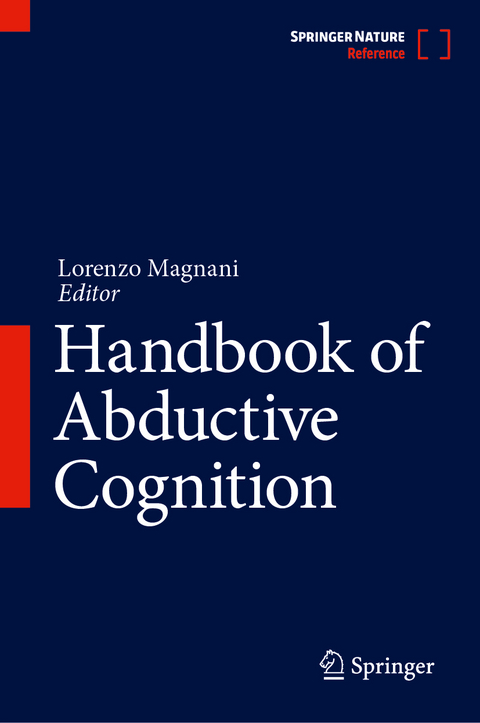
Handbook of Abductive Cognition
Springer International Publishing
978-3-031-10134-2 (ISBN)
Lorenzo Magnani, Editor-in-Chief of the Handbook, philosopher, epistemologist, and cognitive scientist, serves as both a Professor of Philosophy of Science and as the Director of the Computational Philosophy Laboratory, at the University of Pavia, in Italy. During his career, he was a visiting researcher at Carnegie Mellon University and Georgia Institute of Techology in USA, and at McGill University and The University of Waterloo in Canada. He was also a Visiting Professor at Georgia Institute of Technology, City University of New York, and at Sun Yat-sen University, China. Member of the International Academy for the Philosophy of the Sciences (AIPS) from 2015, Professor Magnani also received a Doctor Honoris Causa from the Senate of the Ştefan cel Mare University, Suceava, Romania. In 2010, he received an award from Sun Yat-sen University, China, acknowledging his contributions to the areas of philosophy, philosophy of science, logic, and cognitive science. He published numerous books such as: Abduction, Reason, and Science (Springer, 2001), which has become a reference work in the field of research on human cognition; Morality in a Technological World. Knowledge as Duty (Cambridge University Press, 2007), where a philosophical and cognitive theory of the relationships between ethics and technology is developed in a naturalistic perspective; Abductive Cognition. The Epistemological and Eco-Cognitive Dimensions of Hypothetical Reasoning (Springer, 2009), and Understanding Violence. The Intertwining of Morality, Religion, and Violence: A Philosophical Stance (Springer, 2011). Since 2011, he has been serving as editor-in-chief of the Springer book series “Studies in Applied Philosophy, Epistemology and Rational Ethics (SAPERE)”. In 2017, he published The Abductive Structure of Scientific Creativity. An Essay on the Ecology of Cognition (Springer), adding a novel piece of knowledge to his numerous achievements in the field of abductive cognition. Professor Magnani is also the founder, together with Nancy J. Nersessian and Paul Thagard, and organisers of the Model-Based Reasoning (MBR) conference series, started in 1998. The most recent proceedings of this conference series have been published by Springer. Last but not least, Professor Magnani is the co-editor, together with Tommaso Bertolotti, of the Springer Handbook of Model-Based Science (2017).
Philosophy and Abduction.- Theoretical and Cognitive Issues on Abduction and Scientific Inference.- The Logic of Hypothetical Reasoning, Abduction, and Models.- Abduction and Diagnosis.- Abduction in Mathematics.- Diagrams, Visual models, and Abduction.- Abduction in Cognitive Science and Neuroscience.- Abduction and Computation.- Abduction and Economics.- Abduction in Education and Human Sciences.- Abduction, Ignorance, and Creativity.- Abduction and Technological Design.- Adversarial Abduction (or Abduction and Adversariality).
| Erscheint lt. Verlag | 1.4.2023 |
|---|---|
| Zusatzinfo | XXXV, 1948 p. 186 illus., 56 illus. in color. In 2 volumes, not available separately. |
| Verlagsort | Cham |
| Sprache | englisch |
| Maße | 155 x 235 mm |
| Themenwelt | Geisteswissenschaften ► Philosophie |
| Informatik ► Theorie / Studium ► Künstliche Intelligenz / Robotik | |
| Mathematik / Informatik ► Mathematik ► Angewandte Mathematik | |
| Technik | |
| Schlagworte | Abduction and Cognitive Science • Abduction and Logic • Abduction in Design • Abduction in Economics • Abduction in Education • Abduction in Human Sciences • Abductive Cognition • Adversarial Cognition • Computational Abduction • Creativity • Design • Diagnosis • Diagrams • Hypothetical Cognition • Hypothetical reasoning • Inferential Creative Processes • Inferential Diagrammatic Processes • Logic of Abduction • Model-based Abductive Reasoning • Philosophy of Abduction |
| ISBN-10 | 3-031-10134-0 / 3031101340 |
| ISBN-13 | 978-3-031-10134-2 / 9783031101342 |
| Zustand | Neuware |
| Haben Sie eine Frage zum Produkt? |